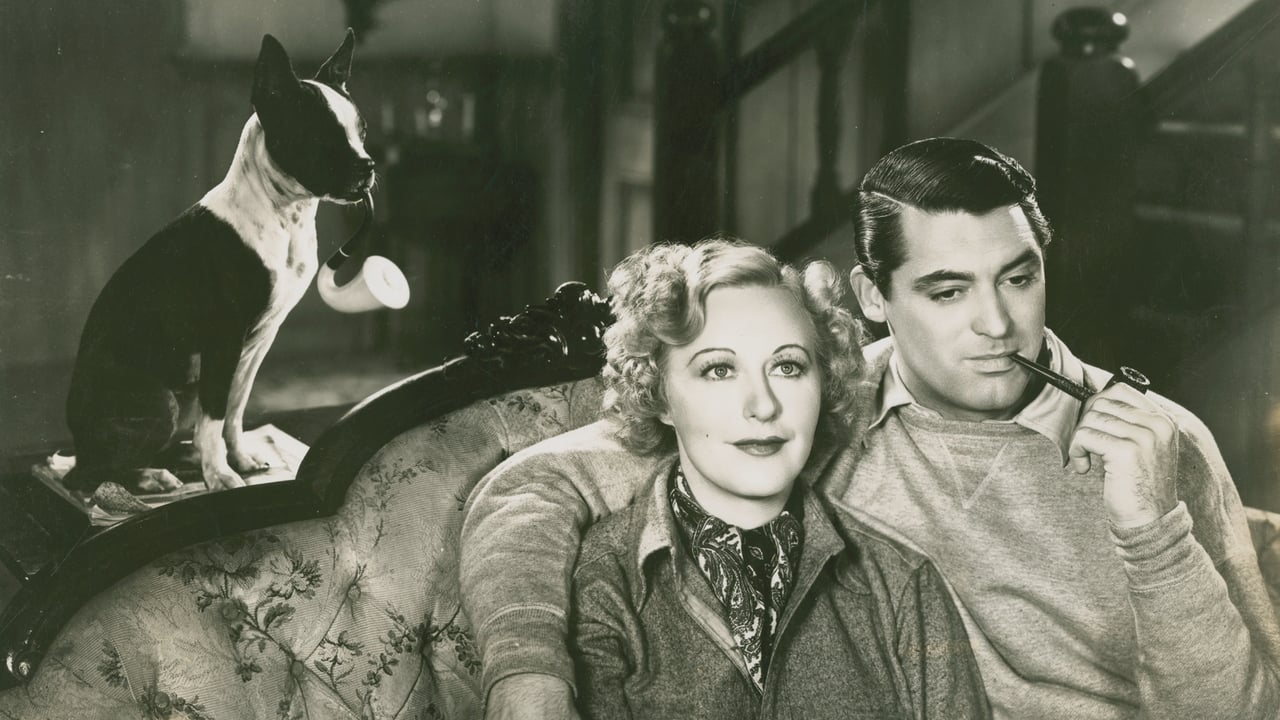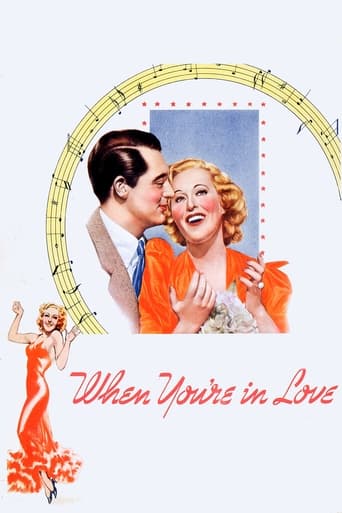

So-so musical romance starring Grace Moore as an Australian opera singer who marries American artist Cary Grant to get back into the United States for an important concert. He tries to win her over with predictable results. Not great stuff but pleasant enough I suppose. Notable for being the only movie directed by screenwriter Robert Riskin (he also wrote this). Also worth mentioning for Moore fans that, in addition to a few opera numbers, she sings "Minnie the Moocher" here. Let's just say it's not likely to be the best rendition of that song you've ever heard. Really, this is one for Grace Moore fans more than Cary Grant ones. He does perfectly fine with his role, don't get me wrong. He's charming and likable as usual. But it's just kind of a dull part for Cary. The supporting cast is nice but greats like Aline MacMahon and Thomas Mitchell are wasted in cardboard cut-out roles. See it for Grace or if you're a Cary completist. Or, heck, see it if you're really into opera (I'm not).
... View MoreDarn! Sad to see that as of November 2016 this title is still not out on DVD. It's a shame because I really enjoyed this film.It stars Cary Grant...my personal favorite actor (along with Spencer Tracy), although he gets second billing to Grace Moore.I was not familiar with Grace Moore, and to be honest -- her kind of singing (operatic soprano) is not my thing at all. But I was truly impressed with her singing and her acting. And, it was hoot seeing her sing "Minnie The Moocher" (which at one time was cut from the film, but has since been restored in this fresh, new print as broadcast on TCM).Cary Grant is excellent here, too. It's that kind of "torn" Cary Grant -- sullen at times, magnetic at other times. And if you want to see the best Cary Grant smile on film...wait for the ending.The story is not particularly unusual -- in fact part of the plot reminds me greatly of another film I saw...but can't remember the title for the life of me, now which came first. The operatic singer is in Mexico trying to get into the States to help an old friend with a musical gala...but can't because she is not an American citizen. Meanwhile, Cary Grant can't leave Mexico due to unpaid bills. So why not marry temporarily and solve both problems? Of course, they do actually fall in love, but her success and his failure to understand why that success is important sinks the relationship. Or does it? In addition to Moore and Grant, another major supporting actor is Aline MacMahon, who (as she often did in film) managed to steal a few scenes as Moore's aide de camp. Another wonderful character actor -- Henry Stephenson -- plays the conductor, and while it's always a pleasure seeing him in a film, he doesn't have a lot to do here, although he is important to the story line. Thomas Mitchell is around as (again) a newspaper reporter, although he doesn't have much to do here.It seems to me that Grant and Moore fit together nicely in this film, which helps it rise above a somewhat standard plot line (although the opera angle is a bit different). And, some of the sets for musical numbers were quite impressive.Very nicely done. I'm hoping I can add it to my DVD collection before long.
... View MoreThe premise for 'When You're in Love' had a lot of potential, Grace Moore was a likable singer/actress who achieved some success as a film star but that was short-lived, Cary Grant was one of the cinema all-time greats and Robert Riskin was a brilliant screen-writers.Any film also, and there's plenty of them around, that tries to give opera (a medium that has been a lifelong passion, but sadly its appeal has become generally increasingly more limited over the years) more popularity and make it more accessible is worthy of some credit. Somehow however, despite some very good things, 'When You're in Love' falls short of its potential.Moore herself is sexy and a very likable and charming screen presence. She also sings very well, especially in "Sibonay". Though "Vissi D'Arte" doesn't sound right for her voice (prefer a bigger and richer voice for Tosca) and doesn't feel right within the film either. 'When You're in Love' doesn't see anywhere near the best of Grant, but his customary urbane charm can be seen in bucket loads and he and Moore do share a sweet chemistry. Aline MacMahon comes very close to stealing the film, her good-nature and sass reminding one of Eve Arden.'When You're in Love' is beautifully shot and sumptuously designed. The music is wonderful, whether pre-existing or written especially for the film, and along with Moore the star of the film, with "Sibonay", "Your Song" and "Minnie the Moocher" coming off best. Choreographically, "Minnie the Moocher" is energetic and enormous fun, by far the best musical number in staging and choreography, and Moore certainly does let her hair down. The scene in the cabin is a lovely scene too.On the other hand, Riskin's talent as a screen-writer is not matched at all by his direction, showing that there was a reason as to why this was the first and only time in the director's chair. Stylistically it's fine, but too much of it dramatically and pulse-wise screams of inexperience and too many of the musical numbers are staged indifferently or bizarrely (so much so that the exuberant "Minnie the Moocher" feels overblown in comparison), Schubert's "Serenade" is an insulting mix of both especially. The story seemed like it would work on paper, but too much of it is bland and implausible with the final act and ending taking a turn for the worse in lack of momentum of ridiculousness.There are scenes and decisions that begged for explanation as to why they happened, especially why "Serenade" was staged the way it was, the placement of "Vissi D'Arte" and much of the pivotal romance, but they never came. While the chemistry itself is sweet, 'When You're in Love' is written in such a flat way (no sparkling bubbles here in this script, just a lot of substance-less froth that becomes dull, strange and too sugary) that one is never fully invested in the romance itself.In conclusion, works well as a Grace Moore vehicle and anybody wanting good music will not be disappointed. There are far better examples of Grant and Riskin's talents elsewhere other than here however. 5/10 Bethany Cox
... View MoreI really enjoyed this movie because I just sat back and listened. Dissection is no fun in film. This is a breezy romp rather than ART! I laughed and had a good time. I enjoyed Cary Grants early performance and adored Grace Moore's singing. Ailene McMahon was a regular Eve Arden pre the spunky Eve herself. The odd part is that Grace plays an Australian opera singer with her American accent while Cary Grant plays an American with his English accent. Miss Moore needs to find a way into the country since she doesn't have permission to enter the states. The border guards must have been much tougher in the 1930's! If you can get your hands on this film just sit back, relax and enjoy.
... View More